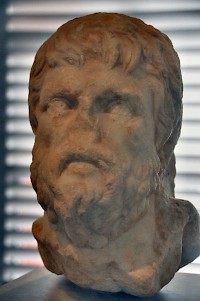Xenophon
Xenophon (c.430-c.354): Athenian soldier and historian, author of the Anabasis and Hellenica. He is one of the best-known and most widely read of all Greek authors.

When Xenophon, the son of Gryllus, was still a young man, he was a student of Socrates and later, he took part in the campaign of the Persian prince Cyrus the Younger against his brother, king Artaxerxes II Mnemon, which failed in the battle of Cunaxa (401).
On his return from the east, Xenophon was in some trouble, because he had by now become a mercenary leader with a band of rather ill-disciplined followers. However, his meeting with the Spartan king Agesilaus II and their joint campaign in Anatolia changed his fortunes. On their return to Greece, the king gave Xenophon a country estate near Olympia, where he started a career as a writer.
Among his other works are a vie romancée of king Cyrus the Great, a Symposium, and a book on horses. His masterpiece is the fascinating account of Cyrus' expedition against king Artaxerxes, the Anabasis. The chapters on Armenia, where the soldiers had to pass through endless snow fields, are among the highlights of Greek literature, and the scene in which the soldiers - somewhere south of Trapezus - shout "Θάλαττα, θάλαττα" ("The sea! The sea!"), knowing they will one day get home from the Armenian hell, has become rightly famous.
Towards the end of his life, Spartan power collapsed (Xenophon's son Gryllus was killed in action in the battle of Mantinea) and the author was forced to move to Corinth. Here he wrote his Hellenica (Greek history), which begins at the point where Thucydides' History of the Peloponnesian War breaks off. This continuity, however, does not apply to the depth of the analysis, because Xenophon lacks the objectivity of his predecessor.
As writer of history, Xenophon greatly inspired later authors, like Arrian of Nicomedia. The Anabasis remains one of the most fascinating texts from the ancient world and is, in fact, the oldest known travel account. The Cyropedia is the world's first vie romancée. Most of his works survive and are used to learn Greek.
From the Hellenica:
Literature
A biography was included in the Lives of Eminent Philosophers by Diogenes Laertius (here).